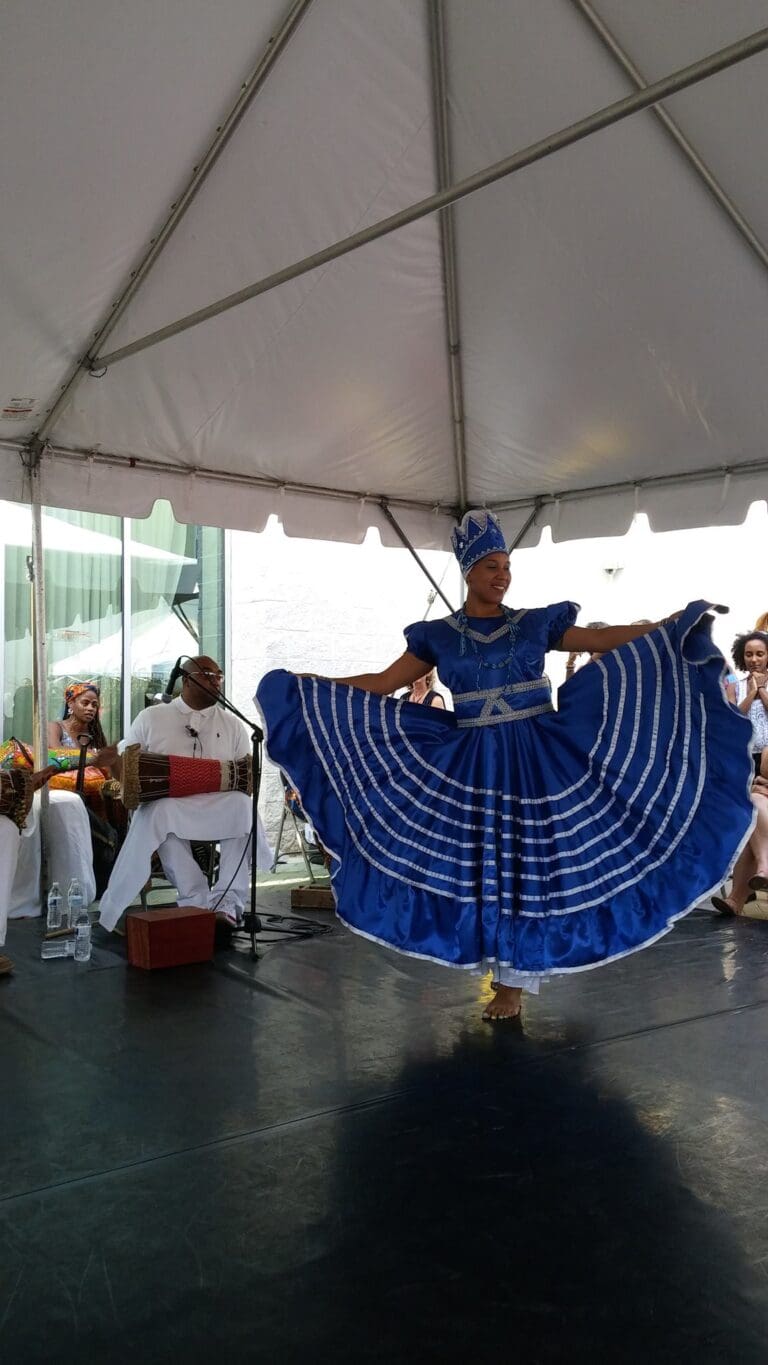
This is part of a series commemorating the inaugural cohort of Duke’s MFA in Dance. Learn more about the program and its 2021 graduates here.
In a contemplation of selfhood, spiritual community and dance as a cultural legacy in Afro-Atlantic diaspora religion, the project “Orisha Dance: Ethnology, Personal Practice, and Pedagogical Explorations” by Namajala Naomi Washington offers a parallel processing of her interrogation of interconnected concepts. They include the Cuban Revolution of the 1950s and, as J Lorand Matory cites, the “Período especial,” along with their bearing on tradition and the folklorization of Lucumí dance forms, and thus the influence of a created, folklorized dance form on the expression of Lucumí traditions.
It also includes the dancers’ experience of transcorporeality in African-diasporic religions; “porous bodies;” “multiple bodies” as they engage cosmic energies; acknowledging—perhaps imagining and bringing voice to the embodied experience not only of the practitioner, but of the interpenetrator—the orishas, ancestral and divine spirits (the energies that flow through their human mounts); and, finally, performances and bodies as vehicles of memory, history, status and access to cosmological connections.
Namajala Naomi suggests across a range of geographies and experiences, contemporary and historical contexts and political landscapes and accesses, that these bearings all intertwine and activate a phenomenon within what is often called a “living tradition.” An embodied scholarly, multidisciplinary process underscores several critical lenses that bridge Washington’s religious beliefs, practices and thought; culturally sanctioned dance and movement pedagogies developed and transmitted within Cuba as well as exported globally; political practices and agendas to “demystify” African-based religions; and, collectively, the possible impact of these notions on bodily transformations over space and time.
As this exploration was conducted during a global pandemic, Washington’s work will certainly invite further commentary on the current reshaping of ritual practices and how, during this period of intense virtual production, new threads of histories and memories facilitated new mechanisms for supporting spiritual awareness and/or connections to the Orisha.
—Prof. Ava Vinesett, Primary Advisor
Namajala Naomi’s artistic research is an embodied investigation of the physical and spiritual medicines available through the pathway of the dances of the Orisha. In Afro-Cuban Lucumí and Regla de Ocha practices, the Orisha are divinities or deities within the hierarchy of a divine pantheon.
Namajala Naomi’s work takes two distinct forms. First is an ethnographic study of the development of Orisha dance both within and outside of its religious and ceremonial context alongside the development of the Lucumí practice. The ethnography highlights the historical and contemporary complexities inherent within the dissemination, instruction and practice of the dances of the Orisha.
Second is the development of a critical pedagogical approach to teaching Orisha dance that centers and seeks to amplify “all that we already are,” as well as the abundance of spiritual potential within each person through the ancestral, cultural and ceremonial practices and the movement and breathing practices of the Orisha in Lucumí Regla de Ocha.
Thesis Advisory Committee: Ava Vinesett
Namajala Naomi’s outward facing project is a fête that took place over the course of two days. A fête, in African traditional religions, is a festival or celebration of selected deities that is open to the public.
This fête, based in the Lucumí Relga de Ocha religious and cultural traditions, was an embodied exploration of the medicine within Orisha dance by celebrating and acknowledging the deities and pathways of Ochún and Ogun. We explored the potential of the practice of Orisha dance to inform or support a dancer’s spiritual awareness and/or connection to the Orishas Ochún or Ogun. We were engaging and embodying the pathways of Ochún and Ogun through an Orisha dance technique class, an installation of ritual and ceremonial objects, and a ceremonialized Orisha dance and song class at the Eno River State Park.
Namajala Naomi Milagros Washington Roque is an artist and educator dedicated to learning, integrating, embodying and sharing the medicines of Afro-Atlantic diaspora movement and music through a spiritual framework. As a native Washingtonian from D.C. with Puerto Rican and African American descent, Namajala Naomi uses her experience and love for Cuban Casino, Afro-Cuban folkloric and traditional West African dance to build healthy, cohesive and diverse communities grounded in the cultural, ancestral and spiritual legacies of the Afro-Atlantic diaspora.
She is currently a principal dancer and instructor for DC Casineros Dance Company in Washington D.C. and has been a member of the company for 10 years. She has taught and performed various Cuban genres, including Casino, Rueda de Casino, Son, Chachacha, Rumba and Afro-Cuban folkloric, with the company both nationally and internationally and has trained with internationally renowned Cuban companies such as Ballet Folklorico Cutumba and Companía All Stars out of Santiago de Cuba.
“Each of us in the beneficiary of an ancient ancestral insight, a knowing, that is unique to our heritage. Those blessing have the power to unleash a tremendous force that can right what is out of balance in our lives and can restore the mind, body, heart and spirit.” —Tobe Melora Correal

